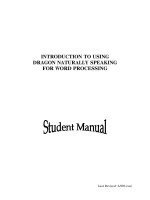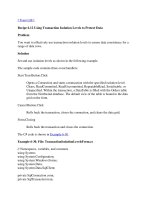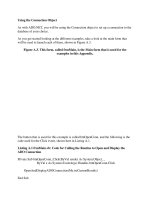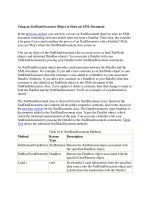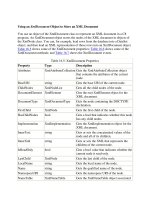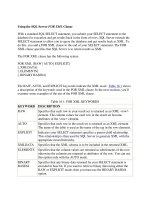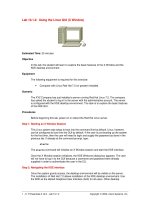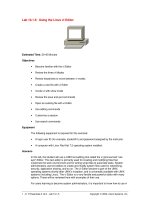Tài liệu Using the Key Class to Add Interactivity docx
Bạn đang xem bản rút gọn của tài liệu. Xem và tải ngay bản đầy đủ của tài liệu tại đây (21.61 KB, 5 trang )
< Day Day Up >
Using the Key Class to Add Interactivity
The Key class is a useful tool for capturing key events from the user (that is, user
interaction with the keyboard). You can employ the Key class for tasks such as these:
• Determining whether a specific key is currently pressed
• Determining the last key pressed
• Obtaining the key code value of the last key pressed
• Adding a Listener that watches for a key event
• Determining whether a certain key (such as Caps Lock) is toggled on or off
The Key class is a top-level class, which means you cannot create a new instance of it.
The most common use of the Key class is to determine whether a specific key is pressed.
You would use this syntax to determine whether a key is being pressed:
Key.isDown(Key.TAB);
The script uses the isDown() method of the Key class to determine whether the Tab key
is currently pressed down. It returns a result of either true or false. The parameter of the
isDown() method can reference either a specific key in the Key class or the key code of a
specific key. Every key on your keyboard has a special number associated with it, called
a key code. For example, the Tab key can be referenced using Key.TAB, or by the
number 9, which is its ASCII equivalent. This script is the essentially the same as the
preceding one:
Key.isDown(9);
In the next simple exercise, you'll move a hot air balloon around the screen using your
keyboard and the Key class.
1. Open balloon1.fla in the Lesson04/Assets directory.
This movie contains three layers: Background, Balloon, and Actions. On the
Balloon layer, you'll see a movie clip instance of a hot air balloon with an instance
name of balloon_mc. The Background layer simply displays an image. In this
exercise, you'll place actions on the first frame of the Actions layer.
2. With the Actions panel open, select Frame 1 in the Actions layer and add this
script:
3.
4. var speed:Number = 3;
5.
At the end of this exercise, you should be able to move the balloon with your
arrow keys. Every time you press the key, the balloon should move a certain
amount. When the movie first starts, this script creates a variable called speed,
which determines how much the balloon moves every time you press a key. When
used in the following scripts, this value represents a distance of 3 pixels.
3. With Frame 1 still selected, add this script at the end of the current script:
4.
5. _root.onEnterFrame = function() {
6.
7. if (Key.isDown(Key.RIGHT)) {
8.
9. balloon_mc._x += speed;
10.
11. } else if (Key.isDown(Key.LEFT)) {
12.
13. balloon_mc._x -= speed;
14.
15. }
16.
17. };
18.
This script uses an onEnterFrame event handler method to evaluate a conditional
statement. Key.RIGHT references the Right Arrow key, and Key.LEFT references
the Left Arrow key. Each time this statement is evaluated, the balloon_mc movie
clip instance is moved to its current x position plus the value of speed if the Right
Arrow key is pressed (moving the instance to the right). However, if the Right
Arrow key is not pressed, that part of the script is ignored and the next part is
evaluated—if the Left Arrow key is pressed, the movie clip instance is moved to
its current x position minus the value of speed (moving the instance to the left).
4. Add this ActionScript to the enterFrame clip event:
5.
6. if (Key.isDown(Key.UP)) {
7.
8. balloon_mc._y -= speed;
9.
10. } else if (Key.isDown(Key.DOWN)) {
11.
12. balloon_mc._y += speed;
13.
14. }
15.
This script is similar to the ActionScript we added in the preceding step. However,
here the if statement reacts to the Up and Down Arrow keys rather than the Right
and Left Arrow keys. The first part of this statement says that if the Up Arrow key
is pressed, the movie clip instance is moved to its current y position minus the
value of speed (moving the instance up). If the Down Arrow key is pressed, the
instance is moved to its current y position plus speed (moving the instance down).
5. Choose Control > Test Movie. Use the Left, Right, Up, and Down Arrow keys to
control the movement of the hot air balloon.
The conditional statements you wrote are performed in each frame of the
onEnterFrame clip event. If one of the keys is detected to be in the down state, the
balloon will be moved accordingly.
6. Close the test movie and save your work as balloon2.fla.
Now you know how to capture a keypress and make something happen as a result.
This script has many applications, including paging through a slide show or
making a game.
< Day Day Up >

